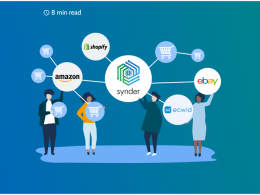Moving to an e-commerce platform is a growing trend seen throughout the business world. It opens up opportunities for companies to compete on a global scale. Organizations that offer products online can capitalize on better communication with their customers and often see a significant increase in overall revenue.
A recent survey conducted by Gartner Analytics showed that 87% of senior business leaders thought their business needed to move online to succeed.
Even with the countless opportunities that moving online provides businesses, it can come with some challenges. Cash flow management is often one area that is more complicated once a company shifts online.
To assist in balancing out elements such as multiple sales channels, different payment processors, and multi-currency accounting, we’ve created a list of useful tips to help you organize your e-commerce business accounting.
Let’s explore how these seven tips can help keep your accounting organized as you transition to an e-commerce platform.
Tip 1 – Proper bookkeeping is a must
Tip 2 – Integrate all your payment processors into one accounting platform
Tip 3 – Automate regular transactions
Tip 4 – Use software to organize multicurrency transactions
Tip 5 – Make sure clients pay on time
Tip 6 – Prepare financial reports regularly
Tip 7 – Schedule your business expenses

7 cash flow management tips for e-commerce businesses
Cash flow management tip #1: Proper bookkeeping is a must
Accurate bookkeeping is an essential part of the accounting process. By categorizing important data like products, customers, location, fees, and taxes, you’ll ensure information is precise and current when it comes time to prepare financial statements.
From the information you pull from your books, you should be able to get a relatively good understanding of important business details such as:
- High-demand products
- Profitable locations
- Customer lifetime value
However, synchronizing all business transactions across multiple accounting platforms can be time-consuming and nerve-wracking.
While some business owners decide to either do it themselves or hire a bookkeeper, bookkeeping automation software is another option.
Advanced accounting software can help quickly synchronize transactions from different sales channels and pull the data into a single report.
Cash flow management tip #2: Integrate all your payment processors into one accounting platform
If your organization uses multiple e-commerce platforms, the first thing you’ll need to think about is finding a way to systemize revenue for your accounting. The biggest hurdle for businesses using multiple platforms is that there are generally different fee amounts associated with each payment processor.
For example, imagine selling your products on Amazon and Etsy and accepting payments in Stripe and PayPal. Each platform has its own receipt sample and charges a different percentage for transferring payment.
Manually recreating this data in your business’s books can take a lot of time. The good news is that most accounting software will allow you to automate this process.
In fact, Synder allows you to connect up to 14 different payment processors and have sales information funneled into one single location.
Cash flow management tip #3: Automate regular payments from clients
Another way to utilize automation to reduce the amount of time you spend on repetitive accounting tasks is to automate recurring client payments.
Most companies have clients that make recurring payments that don’t involve discounts or special offers. In these scenarios, it’s fairly easy to set your accounting software to invoice and accept payments for these clients automatically.
Once a client makes a payment, automatic receipts will be reflected in your online bookkeeping. This, in turn, helps decrease the manual accounting tasks that need to be completed and allows you to focus on other areas of the company.
Cash flow management tip #4: Use software to organize multi-currency transactions
One way for businesses to grow is by expanding their footprint to a global audience. Opening the door for customers in other countries to buy your products is a great way to increase revenue, but it can come with some challenges.
As you begin to sell products in other areas of the world, you’ll have to decide how to handle multi-currency transactions. Accepting multi-currency payments makes it easier for consumers to purchase your items but will make your accounting more complex.
For instance, with multi-currency payments, you’ll need to track currency rates, taxes, and fees associated with each country. If an error were to occur, that could result in the wrong exchange rates being used for transactions and loss of revenue.
Luckily, accounting software such as Synder automatically applies official exchange rates to each transaction. The Synder platform can also automatically review multi-currency transactions recorded in other platforms such as Quickbooks and Xero.
Cash flow management tip #5: Make sure clients pay on time
Another essential step to a healthy cash flow is keeping track of invoice deadlines. While we all hope customers pay on time, a small portion of the invoices sent out won’t be paid by the deadline. Without a consistent inflow of timely payments, paying suppliers and any outstanding debt can be challenging.
One way to decrease the odds of a customer missing their invoice deadline is to use payment automation, payment links, and payment reminders.
With Synder, these elements are rolled into one indispensable feature – Smart Rules. Smart rules allow you to create specific rules for each client that will prompt them to either pay an invoice or send a thank you email once the payment has been received.
Cash flow management tip #6: Prepare financial reports regularly
Consistently preparing financial reports is a must for any business. Each report offers crucial information about your company’s profit and expenses that will assist in making business decisions. To make the process of creating financial reports easier, Synder continuously tracks your sales and expenses in one centralized location.
When it comes time to analyze your business data, Synder accounting software will automatically categorize transactions by the following:
- Product
- Location
- Customer
- Fee
- Tax
- Discount
Cash flow management tip #7: Schedule your business expenses
Every business has moments when an important invoice didn’t come through when it was supposed to, and now you don’t have a way to cover all your expenses. If this happens to your company, there are different ways you can work with your suppliers to adjust when expenses are due.
For instance, asking for longer payment terms will give you additional time for recurring invoices to hit your account. Some suppliers will also allow you to postpone payments for a certain time.
The best way to manage your business expenses is to try and schedule them against your incoming invoices. For some organizations, most of their revenue hits during the first week of each month. In this scenario, you would want to pay your expenses during this time.
Conclusion
While the opportunity to grow your business through a shift to an online platform is significant, it’s important to take the proper steps to set your company up for success. Most organizations worry more about getting their products listed online than they do about the changes in their accounting.
Having an accounting software like Synder to help you automate current accounting processes and manage cash flow is crucial if you want your organization to grow. Book a free Synder demo today to see how smart accounting software can benefit your business.






